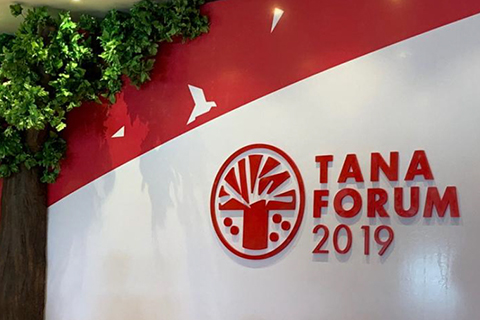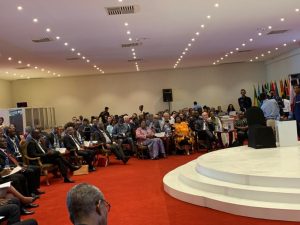
 In the spirit of gatherings taking place under the Baobab tree, the Tana High-Level Forum on Security in Africa is an annual meeting that brings together African leaders and stakeholders to engage and explore African-led security solutions. The Forum complements formal meetings of African heads of state and government by assembling them in an informal, collaborative environment, with room and space for panel discussions, interaction with the floor, and bilateral talks to share views and experiences in a time efficient, result-oriented, and open manner.
In the spirit of gatherings taking place under the Baobab tree, the Tana High-Level Forum on Security in Africa is an annual meeting that brings together African leaders and stakeholders to engage and explore African-led security solutions. The Forum complements formal meetings of African heads of state and government by assembling them in an informal, collaborative environment, with room and space for panel discussions, interaction with the floor, and bilateral talks to share views and experiences in a time efficient, result-oriented, and open manner.
This year’s theme was “Political Dynamics in the Horn of Africa: Nurturing the Emerging Peace Trends.” Critically, African Heads of State and Government discussed migration and free movement of people in the context of peace and security – a dialogue that focused on how migration has been dominated by human trafficking networks. This further illustrated that discussion on peace and security dynamics cannot be done in isolation, and reemphasized how human trafficking is a peace and security issue because it destabilizes communities and weakens governance.
As I listened to the participants discussing this topic, I carried in my heart the stories of several women I had met at Entebbe Airport in Uganda on my way to the Forum. The women, who seemed to be in their early twenties, were dressed in uniform, and had worry written all over the faces. I struck up a conversation with them, and after I earned their trust, they told me they had been recruited and trained to cook and clean for employers in the Gulf states. These women had been given passports and air tickets and were on their way to live and work thousands of miles away from home – knowing they would be unable to leave before the end of their two-year contract without having to pay the recruiter for the training they received and incurring crushing debt. In addition to listening to these girls and women, the immigration official who stamped my passport also shared with me his concerns of the inability to provide protection despite the red flags.
Stories like this illustrate why it is so crucial for government leaders to engage in conversations like the ones held at the TANA Forum. It was therefore very important that more than 200 participants, comprising current and former heads of state and government, civil society and media on the issue of migration discussed how the question of migration in the Horn had long been overshadowed by a focus on displacement and yet mobility in the Horn was increasingly complex with mixed flows comprising of IDPs, refugees, economic migrants, returnees, victims of trafficking and smuggling. It was also emphasized how greater focus needed to be placed on the particular vulnerabilities of specific categories of the displaced and migrants, such as women and youth. From these discussions, it was realized that more needed to be done to understand and address the multiple drivers and root causes of migration. There was also emphasis on continued exchange, coordination and shared approaches on migration, as well as collective engagement by Horn countries with the Gulf States on the status, rights and situation of African migrants.
These discussions only offer a little ray of light for economic migrants like the women I met at the airport. There is an urgent need for these discussions to move beyond TANA Forum into strategic actions by Governments to ensure that economic migrants like the women at the airport feel secure and are protected from all forms of exploitation as they migrate for work as mandated by national, regional and international legal frameworks.